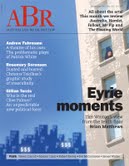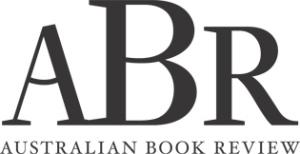My review appears this month in Australian Book Review.
My Mother , My Father, edited by Susan Wyndham Allen & Unwin $29.99
In A Heartbreaking Work of Staggering Genius (2000), novelist Dave Eggers recounts the horror of seeing both his parents die within one year, leaving him and his sister as sole carers of their young brother. Eggers recalls the intense pain of being orphaned at the age of twenty-one, but also the frustration and acute resentment at having to grow up too fast.
There being no uniform pattern to death, it breeds conflicting emotions. Like Tolstoy’s unhappy families, we all face our parents’ final exit in our own way. Susan Wyndham describes the ‘chaos of grief ’ that engulfed her following her mother’s death in 2011. This spurred Wyndham, the Sydney Morning Herald ’s literary editor, to assemble an anthology of essays from some of Australia’s best-known writers, as a tribute to ‘the people who have known us the longest’ – our parents and their legacies.
The fourteen memoirs in My Mother, My Father, include reflections by Helen Garner, Thomas Keneally, David Marr, and Mandy Sayer. Each resonates with a personal voice. Some are diary entries or interlinked thoughts, others more linearly focused. All are united in their unsentimentality and their desire to put cards on the table, frankly assessing both the positive and negative contributions their parents made to the adults they are now.
What emerges is a kaleidoscope of snapshots, vividly recalled anecdotes. As Nikki Barrowclough writes, ‘death gives memory added power’. Caroline Baum, in ‘Waltzing the Jaguar’, remembers her dapper, cosmopolitan, impatient father and their shared love of cars. As a child, she would nestle close to him in the front seat of their Jag when they drove through the car wash, forgetting their frequent rows, ‘as if we have undergone a ritual of purification, all the tensions that encrust the chassis of our family washed away’. Garner, in ‘Dreams of Her True Self ’, recalls spotting a girl on the street wearing a blouse from the 1940s: ‘At the sight of it a bolt of ecstasy went through me, an atavistic bliss.’ Her mother had worn one just like it when she was a baby.
Several memories amuse. Others twist the knife. Kathryn Heyman’s last meeting with her father was in 1990.She had just had her first play produced and was writing a second. He was completely uninterested. ‘Curiosity about my life … is beyond him. I tell myself it’s okay, that I don’t need him to see me, to notice me.’ ‘ A Tale of Two Fathers’ poignantly contrasts this indifference with the approbation and encouragement of Heyman’s late father-in-law.
The need for parental approval remains overwhelming, as does the acute desire to meet expectations. ‘I amhaunted by the things I did not do, the things I should have said,’ Susan Wyndham regrets in ‘Disbelief ’. Thomas Keneally recounts his early years, his ineptitude at school, wishing for parental ‘redemption’ in ‘Independence Days’. He believed himself a ‘massive failure’ in their eyes after abandoning his seminary studies to concentrate on writing, this inadequacy only intensified by the early success of his brother, a doctor.
A young Susan Duncan realised that she had failed to fulfil her mother’s criteria of physical beauty – ‘Esther Jean’ damned with faint praise. ‘It was my mother’s dissatisfaction with me that taught me to distrust praise or compliments (her own rare approval was always delivered with a painful sting in the tail),’ Duncan writes wryly.
Yet even parents found wanting are missed, sometimes with a visceral rawness. The death of Keneally’s father ‘seemed to shatter the interior of the earth I stood on’. ‘ Oh, if only she would walk in here now,’ Garner laments, at the same time acknowledging her mother’s increasingly marginal presence in her life. For others, grief is heartfelt but kept within boundaries. David Marr recalls the deaths of his parents in ‘Afterlife’, admitting: ‘We were never a close family, affectionate but not entangled.’Nevertheless, Marr is ‘struck by something unexpected: a sense of growing into them … I find I am morethem than I ever was. It’s a reassuring surprise. I’m easy in their company.’
So what’s left? Rituals of closure, funerals, wakes, and the mixed blessing of clearing up parental possessions. In ‘Goodbye, Porkpie Hat: 16 Ways to Say Farewell’, Mandy Sayer’s funny, touching, episodic memories of her divorced jazz musician father and alcoholic mother, the flotsam and jetsam of lives left behind includes: ‘the saucer on the coffee table, knotted with roaches from his final joints; a racing guide with numbers scrawled in the margins; crockery and utensils on the sideboard, mostly stolen from pubs and clubs.’
Children also take on their parents’ physical and psychological makeups. ‘Her ghost is in my body,’ writes Garner. ‘I have her long narrow feet with low arches… her fine grey-brown hair that resists all attempts at drama.’ Noting that his parents ‘died in character’, Marr quips that he expects to ‘make a noisy exit clamouring for attention’.
Lingering deaths from cancer or dementia, recounted in stark detail, are harrowing; children wonder how theycan help parents towards a ‘good death’. In a short space of time, Barrowclough’s mother, brother, and partner died; her anguish leaps off the page. But there mare life-affirming stories, too. For Jaya Savige, a chance discovery of a photograph among his dead mother’s belongings led to a reunion with his long-lost biological father. With loss, there is also recovery, growth, understanding. Some kind of an ending; some sort of solace.



November 3, 2013 at 11:35 pm
Yes, I read this at ABR, and meant to comment there but I got distracted. (By life, you know how it is LOL).
A great review, as always:)
November 4, 2013 at 8:02 am
Thanks Lisa – and good luck with your forthcoming session chairing a panel for “Untitled”.
November 6, 2013 at 6:33 pm
Thanks for this, there were many resonances for me and others even in quotes within the review. Having said goodbye to both sets of parents and in-laws, I can confirm the desperate need to help parents towards a ‘good death’ and how often this is outside the children’s control, and how much it helps when they can contribute positively.
November 7, 2013 at 12:07 am
Yes, it’s a tough one Hilary. I have also lost both parents and never even met my late father-in-law. As my mother died of dementia in a nursing home, I recall the frustration and complete hopelessness I felt watching someone who was no longer the Mother I remembered, slip away.
November 11, 2013 at 7:26 am
Thank you so much for sharing with us.
November 11, 2013 at 7:57 am
Thank you for looking at my blog. I have enjoyed reading yours.
January 20, 2014 at 2:06 pm
I have learn a few good stuff here. Definitely price bookmarking for revisiting.
I surprise how so much effort you place to make this sort of wonderful informative web site.
March 10, 2014 at 10:35 pm
Hi, just wanted to say, I loved this article. It was helpful.
Keep on posting!
March 10, 2014 at 11:10 pm
Thanks Kellee